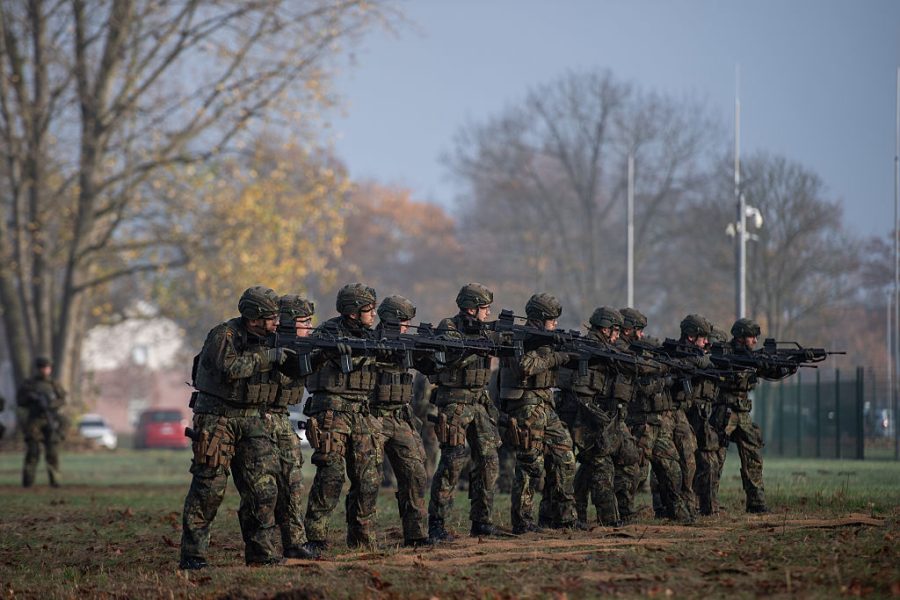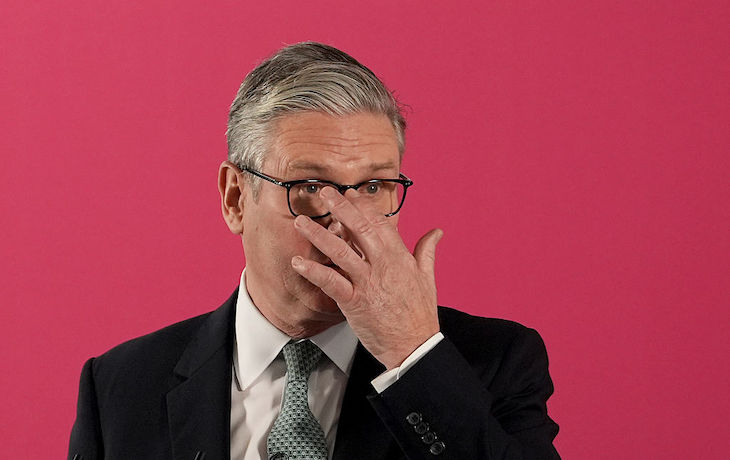Every 11 November, the United Kingdom stands still. Bugles sound, heads bow, and for two minutes the nation remembers – not just the fallen, but the idea that peace was bought at an impossible price. Yet remembrance, if it is to mean anything, must also be a warning.
Europe is again unstable, deterrence is fragile, and Britain’s armed forces are once more the smallest they have been in generations. The difference is that, this time, it is not Germany that alarms us by arming – it is Germany that is doing what Britain will not.
In Berlin, the ghosts of British tanks and troopers still linger. Drive a couple of hundred miles west of the city and you can still see the outlines of training grounds once churned up by the tracks of the British Army of the Rhine. The pubs are gone, the barracks are now neat housing estates with Aldi car parks, and the Union Jack that once fluttered on the German plain has been replaced by playground flags.
Germans have finally accepted that the post-war comfort zone is gone
For half a century after 1945, the British presence on German soil was more than military. It was moral and psychological – a promise that London would anchor Europe’s defence, even when Washington grew distracted. It was Britain’s way of proving that it still mattered, that it was a power of consequence. Now that symbolism has inverted. Where Britain once guaranteed Germany’s security, it is Germany that is quietly guaranteeing Europe’s – and Britain that risks fading into the margins.
A year after the Trinity House Agreement was signed with solemn ceremony and Nato platitudes by defence ministers John Healey and Boris Pistorius, the partnership that was meant to reboot Anglo-German defence looks strangely hollow. The words were grand; the budgets were not.
Berlin, long derided for its pacifism, has turned pragmatic. Chancellor Scholz’s pledge to raise defence spending to 3.5 per cent of GDP by 2029 – to €650 billion (£572 billion) over five years – is not a rhetorical flourish. Contracts are being signed, drones ordered, and for the first time since the Cold War, German forces are forward-deployed with a sense of permanence.
Meanwhile, Britain’s ‘ambition’ to reach 3 per cent of GDP by the 2030s remains a political bedtime story. The Treasury boasts of ‘efficiency’, but the army’s single brigade on Nato’s front line in Estonia is still waiting for basic equipment. £130 million – about £3.50 per taxpayer – would solve the problem: It hasn’t been spent.
The irony is painful. Germany, the country once lectured by every British defence secretary for being soft, slow, or sanctimonious, is now acting with urgency. Britain, which once prided itself on realism, has drifted into abstraction: a nation still speaking the language of power but no longer fluent in its practice.
The philosophical divide is widening. Berlin’s Zeitenwende – its ‘turning point’ after Russia invaded Ukraine – is less about militarism than about maturity. Germans have finally accepted that the post-war comfort zone is gone. Peace cannot be assumed. Deterrence must be rebuilt. London, meanwhile, remains trapped in the rhetoric of the 1990s, a capital more comfortable announcing ambitions than meeting them.
And while Germany is rebuilding its credibility, Britain is dismantling its own. The Northern Ireland Troubles Bill, sold as reconciliation, achieves the opposite. It tells veterans that their loyalty is negotiable and their sacrifice expendable. It feeds the lawyers while starving the soldiers. In Berlin, this kind of legislative theatre would be unthinkable. The German soldier is subject to the law but defended by the state. In Britain, the state is now the accuser.
The demise of the British Army of the Rhine was once a symbol of peace. It has become a metaphor for decay. Britain’s footprint in Europe has shrunk to a token brigade. The Germans, meanwhile, are quietly returning eastward – not as clients of Washington, but as the engine of a European defence architecture that no longer assumes British leadership.
The question now asked, sometimes in whispers, sometimes aloud, is simple: if America tires of Europe, who leads? Ten years ago, the answer would have been Britain. Today, it is Germany – not by charisma, but by sheer investment.
The Trinity House Agreement was supposed to prove that Britain and Germany could stand shoulder to shoulder again. Instead, it has revealed the gap in temperament. Berlin moves with bureaucratic speed but strategic purpose; London moves with rhetorical speed and strategic drift. One is building deterrence, the other managing decline.
This imbalance is not yet irreversible. Britain still has the assets – nuclear, naval, industrial, and cultural – to matter profoundly. But it must start behaving as if it intends to. Leadership is not an inheritance; it is a habit, and ours is fading fast.
Germany, haunted by its past, has learned the hard way that guilt is not a policy. Britain, nostalgic for its past, has yet to learn that pride isn’t either. The story of post-war Europe began with British soldiers guarding the German frontier. It may end with German soldiers guarding Europe’s – while Britain congratulates itself from afar.
The Trinity House Agreement was meant to be a renewal, a deterrence towards Moscow’s might. It may yet become an epitaph: not for the alliance itself, but for the illusion that Britain still leads by right.
In Germany, the ghosts of the British army’s protection are fading. What replaces them will depend on whether London wakes up to the same hard truth Germany already has: that history does not respect sentiment and that power, once surrendered, is rarely returned.







Comments